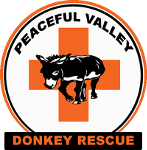Can Donkeys Get Sand Colic?
Yes, sand colic can affect all equines including donkeys, horses, ponies, mules and other hybrids. But for the purpose of this article, we are just talking about donkeys and some of their special considerations.
Sand colic, also known as sand impaction, is a condition where donkeys develop an accumulation of sand or other particulate matter (such as dirt, small rocks or sediment) in their gastrointestinal tract. This typically occurs when donkeys graze on sandy pastures or consume feed or water contaminated with sand. Over time, the sand accumulates and can cause blockages, leading to colic symptoms and potential digestive system damage, or even death, if left untreated.
Prevention of sand colic is essential, and here are some measures you can take:
1. Avoid allowing donkeys to graze on sandy pastures or areas with high sand content. Consider using grazing muzzles or better yet, providing hay in feeders to minimize contact with the ground. This is particularly important during the fall and winter when grazing is sparse and donkeys may be more inclined to get closer to the ground to get to the base of the pasture grasses.
2. If you use any type of pellet or non-hay feeds, provide those in feed pans or troughs to keep donkey lips directly off the ground where sand might be present.
3. Use feeding mats, Place feeding mats or rubber mats under hay or feeders to catch any dropped feed, reducing the risk of sand ingestion.
4. Provide clean water sources. Ensure donkeys have access to clean, fresh water that is free from sand or sediment. Using water troughs with bottom drains or using automatic waterers can help minimize sand intake.
5. Have your vet do fecal checks and deworm as recommended by your vet.. Keeping your donkey's gut working properly (without a heavy worm load) will help their systems work better overall.
6. If you are in a higher risk area with sandy soil, pro-active use of psyllium products to remove sand are known to be very effective. Ask your vet for recommendations.
Know your donkeys “normal”. Donkeys are very stoic and often don’t show signs of distress until it’s too late. It’s a great idea to monitor them for normal behavior so that when something is off you’ll recognize it sooner.
When it comes to treatment for sand colic, it is crucial to consult a veterinarian for an accurate diagnosis and appropriate treatment plan. The treatment approach may involve:
1. Medical management: Your veterinarian may prescribe laxatives or lubricants, such as mineral oil to help move the sand through the gastrointestinal tract. These substances can soften the manure and aid in its passage.
2. Fluid therapy: Intravenous or oral fluids may be administered to maintain hydration and support gastrointestinal function.
3. Pain management: Analgesics may be given to alleviate pain associated with colic symptoms.
In severe cases or when medical management fails, surgical intervention may be necessary to remove the impacted sand from the intestine.
Prompt veterinary intervention is crucial if you suspect sand colic in your donkey. Your veterinarian can provide specific guidance based on your donkey's condition and recommend appropriate preventive measures and treatments.
Remember, if you adopted a donkey through PVDR and your donkey is having a serious medical issue, please contact your PVDR Regional Headquarters and let us know. The collective experience of our consulting vets and donkey experts may be able to provide you and your vet with information that could save your donkey’s life.
